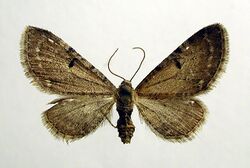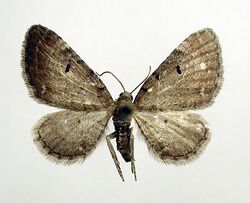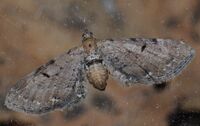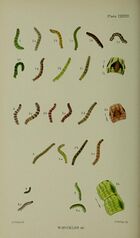Biology:Wormwood pug
| Wormwood pug | |
|---|---|

| |

| |
| Form goossensiata | |
| Scientific classification | |
| Domain: | Eukaryota |
| Kingdom: | Animalia |
| Phylum: | Arthropoda |
| Class: | Insecta |
| Order: | Lepidoptera |
| Family: | Geometridae |
| Genus: | Eupithecia |
| Species: | E. absinthiata
|
| Binomial name | |
| Eupithecia absinthiata (Clerck, 1759)[1]
| |
| Synonyms | |
| |
The wormwood pug (Eupithecia absinthiata) is a moth of the family Geometridae. The species was first described by Carl Alexander Clerck in 1759. It is a common species across the Palearctic region as well as North America.
The wingspan is 21–23 mm and the forewings are warm brown with two black spots along the costa with a black discal spot completing a distinctive triangle. There is a pale narrow line near the fringe with a distinct whitish spot near the tornus, although this is not as prominent as in the rather similar currant pug. The hindwings are greyish brown.ab. obscura Dietze (Kassimov, Central Russia) is much darker, the forewing described as sepia-coloured. [2]
Adult larvae are smooth and elongated. They adapt to the basic colour of the respective food plant and are accordingly greenish, cream-colored or brownish colored and usually show a reddish-brown diamond-like pattern on the back. Sometimes light green, almost imarked[check spelling] specimens also appear. The yellow-brown pupa is provided with greenish wing sheaths. At the cremaster there are eight hook bristles, the middle pair of which is strongly formed. Eupithecia absinthiata requires examination of a genital preparation for certain identification.
The species flies at night in June and July and is attracted to light.
As the name suggests, the larva feeds on the flowers of mugwort (which is sometimes called "common wormwood"), but it will also feed on the flowers of a range of other plants (see list below). The species overwinters as a pupa.
Larval food plants
- Achillea
- Aconitum
- Artemisia
- Aster
- Calluna – heather
- Cirsium – creeping thistle
- Erica
- Eupatorium
- Pimpinella – burnet-saxifrage
- Senecio
- Solidago – goldenrod
- Tanacetum
- Tripleurospermum – Mayweed
Similar species
- Eupithecia assimilata.
- Eupithecia expallidata
References
- ↑ Yu, Dicky Sick Ki. "Eupithecia absinthiata (Clerck 1759)". Taxapad. http://www.taxapad.com/local.php?taxonidLC=82837958.
- ↑ Prout, L. B. (1912–16). Geometridae. In A. Seitz (ed.) The Macrolepidoptera of the World. The Palaearctic Geometridae, 4. 479 pp. Alfred Kernen, Stuttgart.pdf *
 This article incorporates text from this source, which is in the public domain.
This article incorporates text from this source, which is in the public domain.
- Chinery, Michael (1986, reprinted 1991). Collins Guide to the Insects of Britain and Western Europe.
- Skinner, Bernard (1984). The Colour Identification Guide to Moths of the British Isles.
External links
- Kimber, Ian. "70.179 BF1830 Wormwood Pug Eupithecia absinthiata (Clerck, 1759)". https://www.ukmoths.org.uk/species/eupithecia-absinthiata.
- Fauna Europaea
- Lepiforum e.V.
Wikidata ☰ Q2415025 entry
 |



